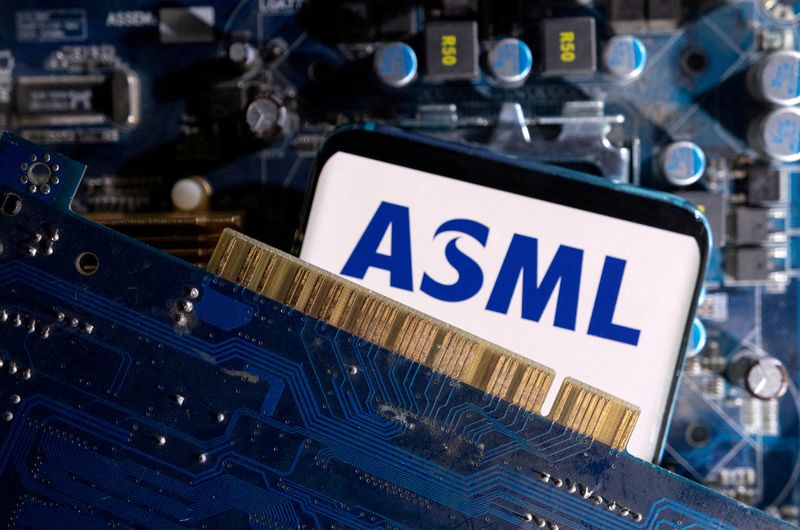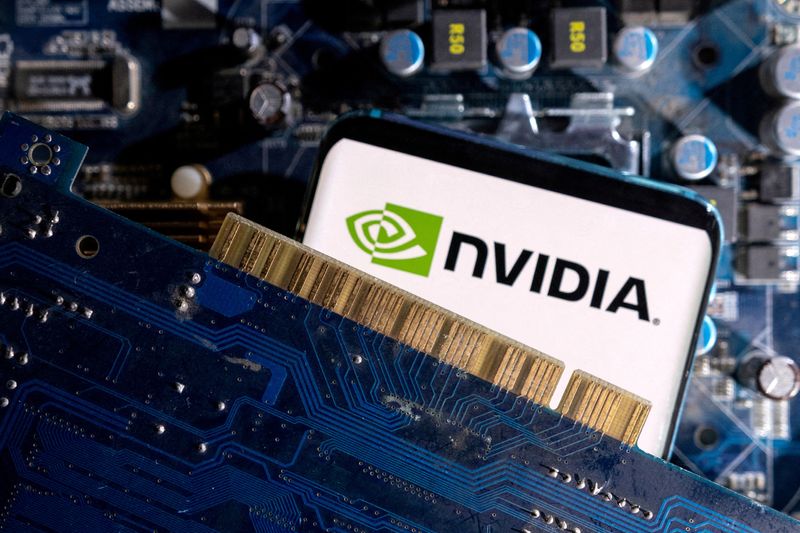By Arsheeya Bajwa
(Reuters) -Wall Street's semiconductor index lost more than $500 billion in stock market value on Wednesday in its worst session since 2020 after a report said the United States was mulling tighter curbs on exports of advanced semiconductor technology to China.
Remarks from Republican presidential nominee Donald Trump saying key production hub Taiwan should pay the United States for its defense deepened selling in chip stocks.
The latest worries for chip investors come after Washington in recent years has adopted a more protective stance for the U.S. semiconductor manufacturing industry, which it views as strategically important for competing against China.
The United States has told allies it is considering using the most severe trade curbs available if companies continue giving China access to advanced semiconductor technology, Bloomberg News reported on Tuesday.
U.S.-listed shares of Dutch chipmaking equipment provider ASML Holding (AS:ASML) slumped 13% following the report even though it beat second-quarter profit estimates.
AI heavyweight Nvidia (NASDAQ:NVDA) fell almost 7%, losing more than $200 billion in market capitalization.
Smaller rival AMD (NASDAQ:AMD) and Arm dropped about 10%. Micron (NASDAQ:MU) fell 6% and Broadcom (NASDAQ:AVGO) lost 8%.
Companies with U.S. chip manufacturing operations gained, with GlobalFoundries (NASDAQ:GFS) jumping almost 7% and Intel (NASDAQ:INTC) edging 0.35% higher. Some analysts believe Intel could benefit from the geopolitical tensions as it is building several plants in the country.
"Market reactions are likely short-lived because the fundamental factors driving these markets haven't changed. Yes, U.S. restrictions on shipments to China will likely increase somewhat - regardless of the U.S. election outcome - but they've already been in place for a while," said Bob O'Donnell, chief analyst at TECHnalysis Research.
President Joe Biden's administration has moved aggressively to curb Chinese access to cutting-edge chip technology, including sweeping restrictions issued in October to limit exports of AI processors designed by firms including Nvidia.
The curbs have dented U.S. chipmakers' sales to China. Nvidia's revenue from China stood at about 18% of its total revenue in the quarter ended April 28, compared with 66% in the year-ago period.
Trump, seeking to regain the presidency in the Nov. 5 U.S. election, told Bloomberg Businessweek that Taiwan should pay the United States for its defense as it does not give the country anything. That sent U.S.-listed shares of Taiwan's TSMC - the world's largest contract chip maker - down 8%.
Taiwan plays an outsized role in the global chip supply chain. Analysts have warned that any conflict over the island may shatter the global economy.
The Philadelphia Semiconductor index collapsed 6.8% in its biggest one-day decline since the COVID pandemic sent global markets into a tailspin.
The index remains up 30% for 2024, outperforming the S&P 500 index's 17% gain, thanks to the AI boom.
INTEL COULD BENEFIT
Intel has been investing heavily to restore a manufacturing edge it lost to TSMC. It is also one of the biggest beneficiaries of the U.S. Chips Act signed by Biden in August 2022, with $52.7 billion in subsidies.
Several policy experts said the U.S. focus on semiconductors will likely continue, even if Trump returns to power, with potentially more curbs on exports to China and support for domestic chipmakers such as Intel.

But they warned of uncertainty about Intel's ability to revitalize its manufacturing business, with the company's foundry segment recording an operating loss of $2.47 billion for the quarter ended March 30.
"It's likely President Trump would not only continue export restrictions, but strengthen them," said Michael Sobolik, a senior fellow at the American Foreign Policy Council. "He initiated many semiconductor export controls during his first administration, including the powerful 'foreign direct product rule' that limited foreign parties from enabling Huawei's access to semiconductors."
